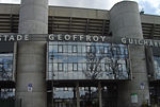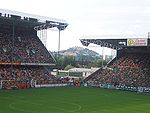
Stade Geoffroy-Guichard
Encyclopedia

Multi-purpose stadium
Multi-purpose stadiums are a type of stadium designed in such a way as to be easily used by multiple sports. While any stadium could potentially host more than one sport, this concept usually refers to a specific design philosophy that stresses multi-functionality over specificity...
in Saint-Étienne
Saint-Étienne
Saint-Étienne is a city in eastern central France. It is located in the Massif Central, southwest of Lyon in the Rhône-Alpes region, along the trunk road that connects Toulouse with Lyon...
, France
France
The French Republic , The French Republic , The French Republic , (commonly known as France , is a unitary semi-presidential republic in Western Europe with several overseas territories and islands located on other continents and in the Indian, Pacific, and Atlantic oceans. Metropolitan France...
. It is used primarily for football
Football (soccer)
Association football, more commonly known as football or soccer, is a sport played between two teams of eleven players with a spherical ball...
matches, and tournaments such as the 1984 European Football Championship, the Football World Cup 1998 and the Confederations Cup 2003. It is also used for rugby union
Rugby union
Rugby union, often simply referred to as rugby, is a full contact team sport which originated in England in the early 19th century. One of the two codes of rugby football, it is based on running with the ball in hand...
, and was a venue at the 2007 Rugby World Cup
2007 Rugby World Cup
The 2007 Rugby World Cup was the sixth Rugby World Cup, a quadrennial international rugby union competition inaugurated in 1987. Twenty nations competed for the Webb Ellis Cup in the tournament, which was hosted by France from 7 September to 20 October. France won the hosting rights in 2003,...
. It is nicknamed "le Chaudron" (the Cauldron), or "l'enfer vert" (the Green Hell), an allusion to the colours worn by the local football team, the AS Saint-Étienne
AS Saint-Étienne
Association Sportive de Saint-Étienne Loire is a French association football club based in Saint-Étienne. The club was founded in 1919 and currently play in Ligue 1, the top division of French football. Saint-Étienne plays its home matches at the Stade Geoffroy-Guichard located within the city...
, given during the team's heyday when it drew particularly large crowds (the record being set in 1985, with more than 47,000 spectators). Its current capacity is 35,616.
The stadium opened on September 13, 1931, and AS Saint-Étienne
AS Saint-Étienne
Association Sportive de Saint-Étienne Loire is a French association football club based in Saint-Étienne. The club was founded in 1919 and currently play in Ligue 1, the top division of French football. Saint-Étienne plays its home matches at the Stade Geoffroy-Guichard located within the city...
's first match there took place on September 17 against FAC Nice. The stadium was named after Geoffroy Guichard, founder of the Casino retail group, who purchased the site on which it was built.
Description
The stadium holds 35,616 people. It is built in the "English style", meaning that there are no corner stands. The four stands are named:- Charles Paret : 8,541 seats
- Jean Snella : 8,767 seats
- Pierre Faurand : 7,993 seats, including 18 boxes and 1200 VIP seats
- Henri Point : 10,315 seats, including 1,200 for visiting fans
The stadium has been renovated at several points during its history. The biggest renovations came in 1984 (for the European Football Championships) and in 1998 (for the World Cup). The stadium's capacity over time has been as follows:
- 1,800 (1931)
- 5,000 (1935)
- 15,000 (1938)
- 25,000 (1957)
- 39,570 (1968)
- 48,274 (including 22,200 seated) (1984)
- 35,616 (all seated) (1998)
History
- The stadium in Saint-Etienne is named after the founder of the Casino stores, headquartered in St. Etienne. Geoffroy Guichard was also owner of the land bought from the family "In Rochetaillée" on the site Estivalière on which the stadium was built.
- The construction of the stadium began in 1930 through the contribution of St. Etienne, responding to a subscription launched by Pierre Guichard, son of Geoffrey. The plans for the original stadium were devised by architects Etienne Thierry Meyer and Michael Saidoun. The stadium consisted of a field surrounded by a 400m running track and a 1,000 seat stand. Underneath the stand were the changing rooms, showers and offices. The total stadium capacity then was about 1,800 people.
- The stadium was opened on September 13, 1931 ( "large" defeat against AS Cannes semi-finalist of the Cup of France: the score of the first game is lost today, sources indicate a defeat in the region of 1–9 to 3–8). ASSE played the first professional match against FAC Nice on September 17, 1933. The first professional match in St Etienne resulted in a 3–2 victory. ASSE won all of this season's 8 games played at home.
- Since 1936, ASSE built a second stand, which became known as the forum Henri Point. Behind each goal, earth embankments were constructed to create a standing section. The stadium capacity rose to 15,000 spectators.
- In 1956, the athletics track was removed. The supporters are closer to the pitch: more like an "English" football stadium.
- 1957: a year later, the stands (seated) are restructured to allow "standing". The stadium capacity is 30,000 spectators. The ASSE wins its first French championship title.
- 1965: floodlights are installed: there are 4 towers of 60 meters in height: they remain until the World Cup.
- September 17, 1968: The city purchases the stadium: the north-south bleachers are covered, the main grandstand was rebuilt: its appearance remains unchanged until 1997 and host games for the World CupFIFA World CupThe FIFA World Cup, often simply the World Cup, is an international association football competition contested by the senior men's national teams of the members of Fédération Internationale de Football Association , the sport's global governing body...
. Next, the ASSE meets Glasgow Celtic in the European Cup. "The Greens" win 2–0 (but lose 0–4 in the second leg). The stadium now contains 40,000 seats. - 1972: Under the influence of Roger Rocher, the club invests in an office building and sports facilities under the platform of the Tower. This achievement is inspired by infrastructures of the great European clubs. The new dressing rooms, under the Henri Point stand are completed, and still exist today.
- 1977: Construction of ground covered annex.
- Substantial work takes place in 1983 to host Euro 1984. 15,000 seats were added and the roof was rebuilt, using Plexiglass. Two matches were held at Geoffroy-Guichard (which sees its international debut there), including a legendary France-Yugoslavia where the late Stéphanois Platini scored a hat-trick.
- October 18, 1994: Saint-Etienne is officially chosen by the COF to host 6 games during the 1998 World Cup. The Stade Geoffroy-Guichard will undergo major work to meet FIFA standards, with a cost of 100 million francs, and 60 million more for facilities outside the stadium. Work began in May 1996. The dressing rooms and locker rooms of the Pierre Faurand stand are renovated, and disabled access is installed. The old floodlight towers were dismantled and new floodlights were installed on each of the four stands. The Faurand Pierre stand, which had not undergone any change for Euro 1984, gains 3,000 balcony seats. The towers disappear from this stand, and the roof is instead held by four metal poles, resting on the back of the rostrum. The Kop-style terraces disappear, replaced by steps and seats. Safety nets and fences are replaced and many cameras are installed to monitor the entire stadium. The pitch is completely re-laid. Note that a plan involving the closure of turnstyles was dismissed. The renovated stadium is opened on May 12, 1998, just one month before the opening World Cup match of Scotland - Brazil.
- Small changes occurred in 2007: The stadium was chosen to host three matches of the 2007 Rugby World Cup. In these circumstances, two giant screens were installed in two corners of the open stand, and the screens were retained after the competition.
- Since summer 2007, the roof of the stadium is leased for 20 years to a company, installing 2 600 m² of solar panels. This is one of the most important industries in France, photovoltaic sensors annual produce 206 996 kWh. Under normal circumstances, assuming there is a domestic use of electricity, it can produce electricity for 60 houses each year. (But taking into account the use of industries and electric utilities, it actually refers to the average electricity consumed annually by 40 people). The plant was used for the communication of EDF in early 2009 with an advertisement broadcast on major French television channels showing St Etienne fans visiting the stadium by tram (electric) and an aerial view of the stadium.
- The outdoor lighting is provided today by 192 projectors, in the four stands.
- In 2009, co-chairmen of the club, Roland Romeyer and Bernard Caiazzo suggest the possibility of building a new stadium for home games of the ASSE, citing in particular the sometimes insufficient capacity of Geoffroy-Guichard. A project is described on a greenfield site of fifteen acres, located north of the Museum of Modern Art. It provokes strong opposition from the four main supporters groups of Etienne. Finally, in late June 2009, the municipality decides in favor of renovating the stadium: the work should begin in 2011 and will need to enclose the four stands. This configuration was referred to the 1998 World Cup. The stadium capacity will increase to 41 000 seats. The VIP areas and a panoramic restaurant will also be created.

